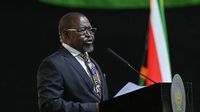In a surprising turn of events, South African Finance Minister Enoch Godongwana has announced that the planned increase in value-added tax (VAT) will not take place, a decision that has drawn both relief and scrutiny from various political factions and the public alike. This announcement was made on Thursday morning, April 24, 2025, and marks a significant shift from earlier proposals that sought to address the country’s fiscal challenges.
Initially, Godongwana had aimed to raise the VAT by two percentage points, but following intense backlash from opposition parties, civil society, and even some members within the African National Congress (ANC), he proposed a more modest increase of 0.5 percentage points to be implemented over two financial years, 2025/26 and 2026/27. However, the growing pressure ultimately led to the complete scrapping of the VAT increase.
The Finance Ministry confirmed the reversal in a media statement, which stated, "The minister of finance will shortly introduce the Rates and Monetary Amounts and the Amendment of Revenue Laws Bill [Rates Bill], which proposes to maintain the VAT rate at 15% from 1 May 2025, instead of the proposed increase to VAT announced in the Budget in March." This marked a sharp U-turn from Godongwana's earlier stance, where he had asserted in court documents that the Democratic Alliance (DA) and the Economic Freedom Fighters (EFF) could not interdict the VAT hike decision.
Godongwana's initial push for the increase was justified by the need to replenish funding for critical frontline services that had suffered due to South Africa's constrained fiscal position. However, as public dissent grew, particularly in light of a dismal performance by the State’s legal team in court, the minister faced mounting pressure to reconsider his stance. The Finance Ministry's statement indicated that the decision followed extensive consultations with political parties and careful consideration of recommendations from parliamentary committees.
Despite the relief felt by many South Africans, the decision not to raise VAT comes with significant financial implications. Godongwana's office warned that failing to implement the increase would result in a revenue shortfall of approximately R75 billion over the next three years. In response to this anticipated gap, the minister has formally withdrawn the Appropriation Bill and the Division of Revenue Bill, signaling a need for revised spending plans to address the deficit.
The Finance Ministry stated, "By not increasing VAT, estimated revenue will fall short by around R75-billion over the medium term. As a result, the minister of finance has written to the Speaker of the National Assembly to indicate that he is withdrawing the Appropriation Bill and the Division of Revenue Bill, in order to propose expenditure adjustments to cover this shortfall in revenue." This means that Parliament will be asked to adjust expenditure to ensure that the loss of revenue does not harm South Africa’s fiscal sustainability.
Moreover, the planned expansion of VAT-free food items, which was intended to cushion lower-income households against the impact of the VAT increase, has also been abandoned. The statement from the Treasury noted, "The decision not to increase VAT means that the measures to cushion lower-income households against the potential negative impact of the rate increase now need to be withdrawn and other expenditure decisions revisited." This raises concerns about how the government will continue to support vulnerable populations in the absence of the VAT increase.
Political reactions have been varied. While some economists hailed Godongwana's retreat as a win for public accountability, others are questioning how the government will sustain critical services without resorting to tax increases. DA leader John Steenhuisen stated that despite the VAT controversy, the DA remains committed to the Government of National Unity (GNU) arrangement, calling it "the best option for the country under current global conditions." This sentiment reflects a broader consensus among some political parties that maintaining stability is crucial, even amidst financial challenges.
As the government grapples with the implications of this decision, the pressure is now on the Treasury to identify alternative revenue-generating measures or implement deeper spending cuts. The economic landscape remains fragile, and the upcoming budget revision will be critical in determining how South Africa navigates its fiscal challenges moving forward.
In light of these developments, political parties that supported the ANC during the initial fiscal framework vote in Parliament are expected to hold a joint press briefing at 10 am on April 24, 2025, to discuss the implications of the VAT decision. However, the DA will be noticeably absent from this gathering, highlighting the ongoing tensions within the GNU.
As the situation unfolds, South Africans will be watching closely to see how the government plans to address the revenue shortfall while ensuring that essential services remain funded. The next few weeks will be pivotal, as Godongwana prepares to introduce a revised version of the Appropriation Bill and Division of Revenue Bill, aimed at addressing the financial gap left by the cancellation of the VAT increase.
In summary, the decision to scrap the VAT increase reflects the complexities of governing in a time of economic uncertainty. It underscores the delicate balance that must be maintained between fiscal responsibility and social equity, particularly as the country seeks to recover from past economic challenges and build a more sustainable future.

